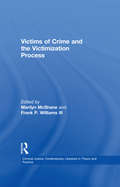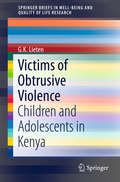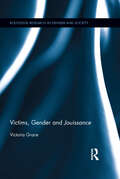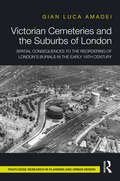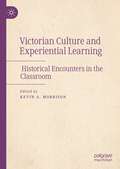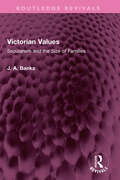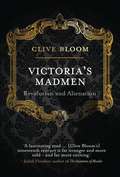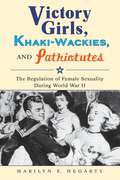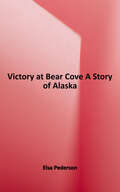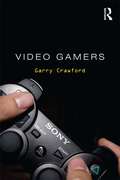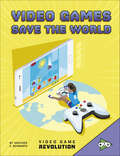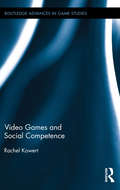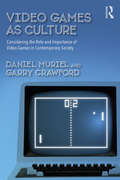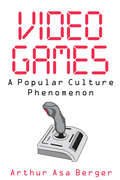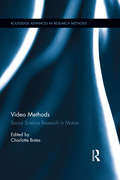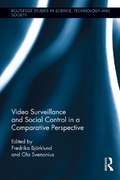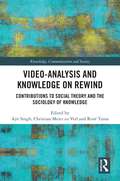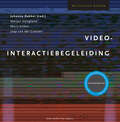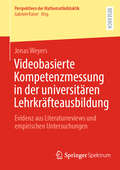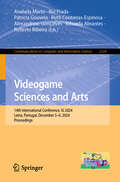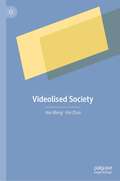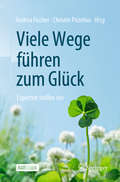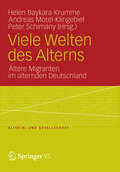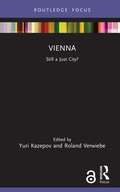- Table View
- List View
Victims of Crime and the Victimization Process (Criminal Justice: Contemporary Literature in Theory and Practice)
by Marilyn McShane Frank P. WilliamsVolume 6 in the 6-volume series titled Criminal Justice: Contemporary Literature in Theory and Practice. This compilation of articles attempts to fill gaps in existing resources with some of the best current statements on the topic. Subjects include the characteristics of victims, the effects of crime on victims, and some contemporary theories of victimization. Also included are evaluations of a variety of victim-oriented policies and programs, such as victim assistance, peace-making, and victim-impact statements. This title will be of great utility to students, scholars, and others with interests in the literature of criminal justice and criminology.
Victims of Obtrusive Violence
by G. K. LietenThis volume describes how children's experience with violence may affect and endanger their education, as well as their physical safety and their general well-being. It includes all forms of physical , psychological and sexual abuse, and neglect against children at home, at school, and in public spaces in two different areas of Kenya (rural and urban), while taking into account its environmental and cultural factors. This volume is unique, not only because of its focus on a less researched yet highly acute social problem but also because it provides inside knowledge by giving the children a voice through their direct participation in the data collection.
Victims, Gender and Jouissance: Victims, Gender And Jouissance (Routledge Research in Gender and Society)
by Victoria GraceVictimization has a long, cross-cultural history. The status of the victim has been the source of active and stirring controversy in cultural theory, criminology and legal theory, philosophy and psychoanalysis; it is of particular interest within feminist theory. Can the victim relation be refused? Are we all victims? The aim of this book is to analyze the intersection of gender and the victim, and the role of a libidinal enjoyment (jouissance) in knotting this relation. The enduring link between the construct of the victim and the sacrificial processes at its heart reveals something ultimately compelling about sacrifice. Legislating victimization out of existence will fail because the victim relation is central to the very formation of human subjectivity and implicated in the reproduction of social life. Lacanian psychoanalysis is used to interrogate the limits to arguments for resolving the problem of sacrificial violence: from Girard to Bataille, from Butler to Kristeva, from de Sade to Nietzsche. However, without denying the inevitable structuring power of the signifier, only its relentless reversion, or undoing, will expose the myths that sustain it, and create an opening within the social beyond this impasse. Such a break is theorized through a confrontation of Lacan with Baudrillard.
Victorian Cemeteries and the Suburbs of London: Spatial Consequences to the Reordering of London’s Burials in the Early 19th Century
by Gian Luca AmadeiThis book explores how Victorian cemeteries were the direct result of the socio-cultural, economic and political context of the city, and were part of a unique transformation process that emerged in London at the time. The book shows how the re-ordering of the city’s burial spaces, along with the principles of health and hygiene, were directly associated with liberal capital investments, which had consequences in the spatial arrangement of London. Victorian cemeteries, in particular, were not only a solution for overcrowded graveyards, they also acted as urban generators in the formation London’s suburbs in the nineteenth century. Beginning with an analysis of the conditions that triggered the introduction of the early Victorian cemeteries in London, this book investigates their spatial arrangement, aesthetics and functions. These developments are illustrated through the study of three private Victorian burial sites: Kensal Green Cemetery, Highgate Cemetery and Brookwood Cemetery. The book is aimed at students and researchers of London history, planning and environment, and Victorian and death culture studies.
Victorian Culture and Experiential Learning: Historical Encounters in the Classroom
by Kevin A. MorrisonThis book is a crucial resource for instructors interested in bringing the past alive for their students through hands-on, immersive educational experiences. While sharing a common historical field, the contributors hail from multiple disciplines, including art history, human biology, biological anthropology, and English literature. Ranging from assignments that involve students editing and annotating a primary work to producing an array of digital projects, and from participating in study-abroad programs to taking part in service-learning initiatives, the chapters will furnish readers with strategies for creating engaged and dynamic classrooms. Although the focus of the book is on Victorian Britain, the pedagogical approaches outlined in each chapter will be useful to instructors of any historical field.
Victorian Values: Secularism and the Size of Families (Routledge Revivals)
by J A BanksFirst published in 1981, Victorian Values is an investigation into the social causes behind the decline of the birth rate and the size of families in Britain in the second half of the nineteenth century. The author looks at the interplay of the rising standard of living, the emancipation of women, the attitude to children and education and the effects of the meritocratic ideal, and their interaction with religious ideas of sexual morality. He considers the pioneers of birth control, but other factors are considered which might contribute to the retreat from the very large families of an earlier period. The book is a brilliant example of how the sociologist can illuminate the problems of the social and economic historian, and at the same time contribute to developing ideas about future social policy.
Victoria’s Madmen
by Clive Bloom'Victoria's Madmen' is about those marginal 19th century voices which became the cacophony of the 20th century - the noise of revolutions shaking both the stability of society and the meaning of self. It tells the stories of figures including Oscar Wilde and Karl Marx, the outcasts and non-conformists of the Victorian age.
Victory Girls, Khaki-Wackies, and Patriotutes: The Regulation of Female Sexuality during World War II
by Marilyn E HegartyA study of how the U.S. government&’s World War II fight against venereal disease transformed into a war against women.Victory Girls, Khaki-Wackies, and Patriotutes offers a counter-narrative to the story of Rosie the Riveter, the icon of female patriotism during World War II. With her fist defiantly raised and her shirtsleeves rolled up, Rosie was an asexual warrior on the homefront. But thousands of women supported the war effort not by working in heavy war industries, but by providing morale-boosting services to soldiers, ranging from dances at officers&’ clubs to more blatant forms of sexual services, such as prostitution. While the de-sexualized Rosie was celebrated, women who used their sexuality—either intentionally or inadvertently—to serve their country encountered a contradictory morals campaign launched by government and social agencies, which shunned female sexuality while valorizing masculine sexuality. This double-standard was accurately summed up by a government official who dubbed these women &“patriotutes&”: part patriot, part prostitute. Marilyn E. Hegarty explores the dual discourse on female sexual mobilization that emerged during the war, in which agencies of the state both required and feared women&’s support for, and participation in, wartime services. The equation of female desire with deviance simultaneously over-sexualized and desexualized many women, who nonetheless made choices that not only challenged gender ideology but defended their right to remain in public spaces.
Victory at Bear Cove
by Elsa PedersonThis work has been selected by scholars as being culturally important and is part of the knowledge base of civilization as we know it. This work is in the public domain in the United States of America, and possibly other nations. Within the United States, you may freely copy and distribute this work, as no entity (individual or corporate) has a copyright on the body of the work. Scholars believe, and we concur, that this work is important enough to be preserved, reproduced, and made generally available to the public. To ensure a quality reading experience, this work has been proofread and republished using a format that seamlessly blends the original graphical elements with text in an easy-to-read typeface. We appreciate your support of the preservation process and thank you for being an important part of keeping this knowledge alive and relevant.
Video Gamers
by Garry CrawfordVideo gaming is economically, educationally, culturally, socially and theoretically important, and has, in a relatively short period of time, firmly cemented its place within contemporary life. It is fair to say, however, that the majority of research to date has focused most specifically on either the video games themselves, or the direct engagement of gamers with a specific piece of game technology. In contrast, Video Gamers is the first book to explicitly and comprehensively address how digital games are engaged with and experienced in the everyday lives, social networks and consumer patterns of those who play them. In doing so, the book provides a key introduction to the study of gamers and the games they play, whilst also reflecting on the current debates and literatures surrounding gaming practices.
Video Games Save the World (Video Game Revolution)
by Heather E. SchwartzTo save the world, one must play video games. Sounds ridiculous, right? But in reality many people are looking to video games to tackle many of the world's problems. Take a closer look at the ways in which video games can help save the world.
Video Games and Social Competence (Routledge Advances in Game Studies)
by Rachel KowertDespite their popularity, online video games have been met with suspicion by the popular media and academic community. In particular, there is a growing concern that online video game play may be associated with deficits in social functioning. Due to a lack of empirical consistency, the debate surrounding the potential impact of online video game play on a user’s sociability remains an active one. This book contributes to this debate by exploring the potential impact of online video game involvement on social competence outcomes, theoretically and empirically. Through empirical research, Kowert examines the relationships between online video game involvement, social goals, and social skills and discusses the underlying mechanisms of these effects.
Video Games as Culture: Considering the Role and Importance of Video Games in Contemporary Society (Routledge Advances in Sociology)
by Garry Crawford Daniel MurielVideo games are becoming culturally dominant. But what does their popularity say about our contemporary society? This book explores video game culture, but in doing so, utilizes video games as a lens through which to understand contemporary social life. Video games are becoming an increasingly central part of our cultural lives, impacting on various aspects of everyday life such as our consumption, communities, and identity formation. Drawing on new and original empirical data – including interviews with gamers, as well as key representatives from the video game industry, media, education, and cultural sector – Video Games as Culture not only considers contemporary video game culture, but also explores how video games provide important insights into the modern nature of digital and participatory culture, patterns of consumption and identity formation, late modernity, and contemporary political rationalities. This book will appeal to undergraduate and postgraduate students, as well as postdoctoral researchers, interested in fields such Video Games, Sociology, and Media and Cultural Studies. It will also be useful for those interested in the wider role of culture, technology, and consumption in the transformation of society, identities, and communities.
Video Games: A Popular Culture Phenomenon
by Arthur Asa BergerFrom their inception, video games quickly became a major new arena of popular entertainment. Beginning with very primitive games, they quickly evolved into interactive animated works, many of which now approach film in terms of their visual excitement. But there are important differences, as Arthur Asa Berger makes clear in this important new work. Films are purely to be viewed, but video involves the player, moving from empathy to immersion, from being spectators to being actively involved in texts. Berger, a renowned scholar of popular culture, explores the cultural significance of the expanding popularity and sophistication of video games and considers the biological and psychoanalytic aspects of this phenomenon.Berger begins by tracing the evolution of video games from simple games like Pong to new, powerfully involving and complex ones like Myst and Half-Life. He notes how this evolution has built the video industry, which includes the hardware (game-playing consoles) and the software (the games themselves), to revenues comparable to the American film industry.
Video Methods: Social Science Research in Motion (Routledge Advances in Research Methods #10)
by Charlotte BatesThis interdisciplinary collection provides a set of innovative and inventive approaches to the use of video as a research method. Building on the development of visual methods across the social sciences, it highlights a range of possibilities for making and working with video data. The collection showcases different video methods, including video diaries, video go-alongs, time-lapse video, mobile devices, multi-angle video recording, video ethnography, and ethnographic documentary. Each method is presented through a case study, showing how it can be used in practice. The authors offer pragmatic advice and discuss practical issues, including equipment, techniques and skills, analysis, and presentation. They also show how video methods can be used in a range of different contexts – at train stations, on bicycles, in schools, outdoors, and in museums – to investigate worlds that are visible, audible, tangible, and in motion. In doing so, they illuminate the theoretical possibilities that video methods offer for researching the body, identity, everyday life, affect, time, and space.
Video Surveillance and Social Control in a Comparative Perspective (Routledge Studies in Science, Technology and Society #19)
by Fredrika Björklund Ola SvenoniusThis edited collection reports the results of a comparative study of video surveillance/CCTV in Germany, Poland, and Sweden. It investigates how video surveillance as technologically mediated social control is affected by national characteristics, with a specific concern for recent political history. The book is motivated by asking what makes video surveillance "tick" in three very different cultural settings, two of which (Poland and Sweden) are virtually unexplored in the literature on surveillance. The selection of countries is motivated by an interest in societies with recent experiences of authoritarianism, and how they respond to the global trend towards intensified technical means of control. With thorough empirical studies, the book constitutes an important contribution to security studies, surveillance studies, and post-communist area studies.
Video-Analysis and Knowledge on Rewind: Contributions to Social Theory and the Sociology of Knowledge (Knowledge, Communication and Society)
by Ajit Singh René Tuma Verl, Christian Meier zuThis volume applies interpretive video‑analysis to explore the intersections between the sociology of knowledge and interaction studies. Presenting a series of studies that draw on video‑analytic and videographic approaches to research, it examines the way video data can shed light on connections between social phenomena at the micro‑, meso‑, and macro‑levels, and the access that it grants to the temporality of social reality. With empirical research in fields such as care, consumption, gaming, military, music, science, and violence, the studies in this volume show how the video‑analytic approach provides an empirical basis for progress in social theory and aids the development of the concept of knowledge. As such, it will appeal to scholars of sociology with interests in social theory, the sociology of knowledge, and visual methods in social research.
Video-interactiebegeleiding (Methodisch werken)
by J. den Dekker A.I.T., OCK Het Spalier J.M. DekkerDit basisboek gaat over video interactiebegeleiding (VIB), een methode die gebruik maakt van videobeelden en de principes van basiscommunicatie om de begeleiding van cliënten en professionals vorm te geven. De methode is breed inzetbaar en kan worden toegepast in jeugdhulpverlening, thuiszorg, gehandicaptenzorg, jeugdgezondheidszorg, maatschappelijk werk enzovoort.De auteurs belichten video interactiebegeleiding in al haar facetten en behandelen de uitgangspunten en de wijze waarop de videobeelden van interacties met behulp van basiscommunicatie worden geanalyseerd.De illustratieve praktijkverhalen in Video interactiebegeleiding maken duidelijk hoe VIB-ers de uitgangspunten van de VIB-theorie toepassen. Ter verduidelijking van de tekst zijn foto's opgenomen.Op de bij het boek behorende website wordt video-interactiebegeleiding in de praktijk zichtbaar maakt. Drie ouders en enkele pedagogische medewerkers laten zien dat - door gebruik van videobeelden bij de begeleiding - een betere afstemming tussen de gezinssituatie en de groepssituatie tot stand komt.
Videobasierte Kompetenzmessung in der universitären Lehrkräfteausbildung: Evidenz aus Literaturreviews und empirischen Untersuchungen (Perspektiven der Mathematikdidaktik)
by Jonas WeyersInnerhalb der Forschung zur professionellen Kompetenz von Lehrkräften kommen vermehrt videobasierte Kompetenzmessungen zum Einsatz. Durch die Kombination von Videomaterial unterrichtlicher Praxis mit spezifischen Testfragen sollen Rückschlüsse auf handlungsnahe Kompetenzen bzw. sogenannte situationsspezifische Fähigkeiten von Lehrkräften ermöglicht werden. Auf Basis von zwei Literaturreviews untersucht die vorliegende Arbeit die Konzeption und Erfassung situationsspezifischer Fähigkeiten am Beispiel des Konstrukts "Teacher Noticing", welches in der mathematikdidaktischen Forschung besonders verbreitet ist, und gibt einen umfassenden Überblick zu vorliegenden Testinstrumenten, die auf dieses Konstrukt abzielen. Insbesondere wird diskutiert, inwieweit unterschiedliche Messansätze zu vergleichbaren Ergebnissen führen und welche Konsequenzen sich aus der Heterogenität der Messansätze für den wissenschaftlichen Diskurs ergeben. Anhand zweier empirischer Arbeiten wird weiterführend geprüft, inwieweit anspruchsvolle videobasierte Kompetenzmessungen bereits mit Lehramtsstudierenden einsetzbar sind und Rückschlüsse auf deren Kompetenzentwicklung zulassen. Die Ergebnisse stützen dabei grundsätzlich die Einsetzbarkeit in der universitären Phase der Lehrkräfteausbildung, wobei sich nur geringe Zusammenhänge zu den Lerngelegenheiten innerhalb dieses Ausbildungsabschnitts zeigen.
Videogame Sciences and Arts: 14th International Conference, VJ 2024, Leiria, Portugal, December 5–6, 2024, Proceedings (Communications in Computer and Information Science #2324)
by Rui Prada Anabela Marto Patrícia Gouveia Ruth Contreras-Espinosa Alexandrino Gonçalves Eduarda Abrantes Roberto RibeiroThis book constitutes the refereed proceedings of the 14th International Conference on Videogame Sciences and Arts, VJ 2024, held in Leiria, Portugal, during December 5–6, 2024. The 15 full papers and 3 short papers included in this book were carefully reviewed and selected from 30 submissions. They were organized in topical sections as follows: Player Experience and Accessibility; Serious Games; Edutainment; Game Design and Development; and Games and Artificial Intelligence.
Videolised Society
by Hui Zhao Jian MengThis book traces the development of video (especially short video, duan shipin) in China over the past few years, exploring how these videos engaged with China’s rapidly changing society, how they enriched existed theories of society, media and communication, and new theories to be extracted. The book offers a new, critical model for understanding the relationship between video, video theory, video industry and the State. This book sheds light on the overall description and explanation of the current socio-political, economic and cultural environment concerning the development of video (especially short video). It interprets the emergence of the “Social Videolization” through the subjects of media psychology, communication studies and cultural criticism, media industrial studies, sociology and anthropology.
Viele Wege führen zum Glück: Experten stellen vor
by Andrea Fischer Christin PrizeliusVerschiedene Wege führen zum Glück – finden Sie Ihren!Dieses Buch richtet sich an alle Menschen, die sich mit dem Thema Glück für sich und andere beschäftigen, und zeigt, dass das Glück oft näher und greifbarer ist als gedacht. Für jeden bedeutet Glück etwas anderes und jeder Mensch darf dabei selbst herausfinden, was ihn glücklich macht. Wissenschaftlich fundiert und praxisnah bieten die Autoren vielseitige Inspirationen zum Thema. Sowohl aktuelle Forschungsfelder als auch individuelle Projekte werden verständlich und konkret dargestellt. Dabei wird der Leser eingeladen zu reflektieren und eigene Impulse zu setzen. Ziel ist mehr Lebensfreude, eine ganzheitliche positive Ausrichtung und Einstellung, sowohl für den Einzelnen als auch die Gesellschaft und damit eine bessere Gesundheit und mehr Wohlbefinden. Entdecken Sie Ihren Weg zum Glück und gestalten Sie ihn selbst aktiv mit!
Viele Welten des Alterns
by Andreas Motel-Klingebiel Peter Schimany Helen Baykara-KrummeIn der Alternsforschung wurden Menschen mit Migrationshintergrund bisher weitgehend ausgeblendet und in der Migrationsforschung fanden ältere Menschen kaum Beachtung. Angesichts des zunehmenden Anteils Älterer in der Migrantenbevölkerung wird eine Verknüpfung der beiden Forschungszweige aber immer wichtiger. Das vorliegende Buch widmet sich der Auseinandersetzung mit dem Altern unter Migrationsbedingungen und der Lebensqualität älterer Migrantinnen und Migranten. Auf der Basis theoretischer Reflexionen, empirischer Befunde und politischer Überlegungen bietet der vorliegende Band erstmals einen fundierten Überblick über den aktuellen Kenntnis- und Diskussionsstand im Schnittfeld der beiden Forschungsgebiete.
Vielfalt und Einheit der Kritischen Theorie – Kulturwissenschaftliche Perspektiven
by Oliver KozlarekDie in diesem Buch versammelten Arbeiten gehen der Frage nach, ob die Tradition der Kritischen Theorie mit ihrer multifokalen und vor allem interdisziplinären kritischen Sozialforschung dem Anspruch einer übergreifenden politischen wie wissenschaftlichen Praxis der Kritik für unsere aktuellen Gesellschaften gerecht wird. Es geht somit auch um eine „Aktualisierung“ der Kritischen Theorie. Diese soll aber gerade nicht durch das Herausarbeiten eines neuen Begriffsinstrumentariums diagnostischer und/oder normativer Art geschehen, sondern dadurch, dass ganz im Sinne des interdisziplinären Forschungsansatzes der Kritischen Theorie unsere hochkomplexen spätmodernen Gesellschaften als Räume transparent werden, in denen sich unterschiedliche Erfahrungslinien kreuzen.
Vienna: Still a Just City? (Built Environment City Studies)
by Yuri KazepovThis book explores and debates the urban transformations that have taken place in Vienna over the past 30 years and their consequences in policy fields such as labour and housing, political and social participation and the environment. Historically, European cities have been characterised by a strong association between social cohesion, quality of life, economic ambition and a robust State. Vienna is an excellent example for that. In more recent years, however, cities were pressured to change policy principles and mechanisms in the context of demographic shifts, post-industrial transformations and welfare recalibration which have led to worsened social conditions in many cities. Each chapter in this volume discusses Vienna’s responses to these pressures in key policy arenas, looking at outcomes from the context-specific local arrangements. Against a theoretical framework debating the European city as a model of inclusion and social justice, authors explore the local capacity to innovate urban policies and to address new social risks, while paying attention to potential trade-offs. The book questions and assesses the city’s resilience using time series and an institutional analysis of four key dimensions that characterise the European city model within the context of post-industrial transition: redistribution, recognition, representation and sustainability. It offers a multiscalar perspective of urban governance through labour, housing, participatory and environmental policies, bringing together different levels and public policy types. Vienna: Still a Just City? is aimed at academics, researchers and policy-makers in urban studies, including urban sociology, ecology, geography and welfare.
